CESA
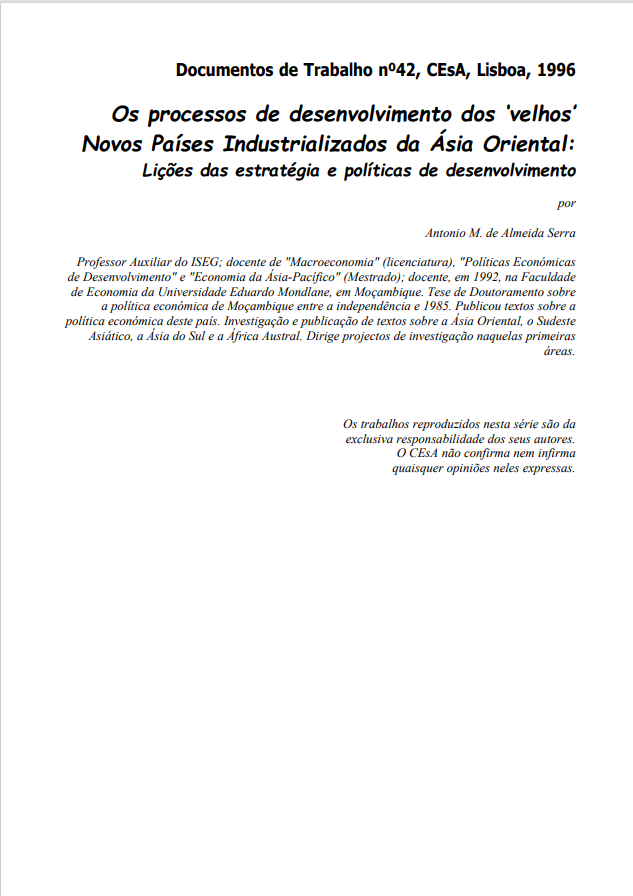
Working Paper 42/1996: Os processos de desenvolvimento dos ‘velhos’ novos países industrializados da Ásia Oriental: lições das estratégia e políticas de desenvolvimento
Abstract:
The purpose of Os processos de desenvolvimento dos ‘velhos’ novos países industrializados da Ásia Oriental: lições das estratégia e políticas de desenvolvimento is to present a reflection on the general lines of evolution of the group of East Asian countries commonly known as New Industrialized Countries and to reflect on the possible applicability to other countries, namely in Sub-Saharan Africa, of outward-looking strategies. that have continued in a clearer way since the 60s. In the first section we present what could be called the geographical, human and cultural “mosaic” of the region, while in the second our attention will focus on the presentation of aspects fundamental aspects of the economic process of two of the “Four Dragons” (Korea and Taiwan) in the last 30-35 years, but starting with a synthesis of what happened in the most recent period and which, to a large extent, justifies the interest that researchers and practitioners development has been manifested by the evolution of the countries of East and Southeast Asia. Having described this evolution, in the third section we present the main characteristics of the development strategies and economic policies that are responsible for the rapid economic growth and the increasing participation of those economies in the world market. Based on the analysis carried out in the previous section, we will try to draw some lessons that, taking into account the differences between the structures (ecological, economic, social and cultural) of East Asia and Sub-Saharan Africa, can be useful in the effort to development that, after the most serious moments of the economic crisis that has affected it since the beginning of the 1980s, it will have to carry out in order to see a significant and sustained improvement in the situation of its populations. In this context, special relevance will be given to the case of Mozambique. We will conclude with a brief summary and a summary of our conclusions. At the end there is a bibliography and a statistical annex.
Quotation:
Serra, António M. de Almeida. 1996. “Os processos de desenvolvimento dos ‘velhos’ novos países industrializados da Ásia Oriental: lições das estratégia e políticas de desenvolvimento”. Instituto Superior de Economia e Gestão. CEsA – Documentos de Trabalho nº 42/1996
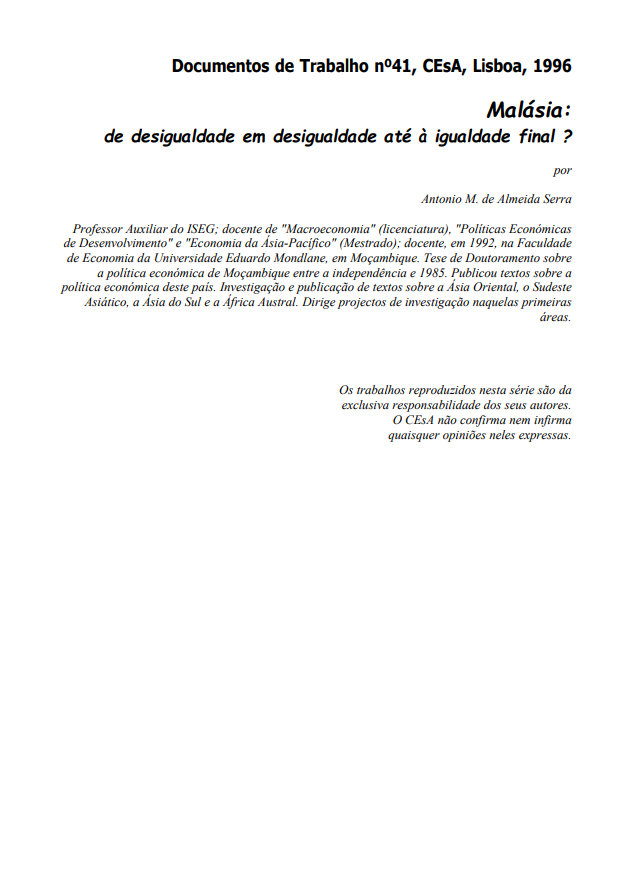
Working Paper 41/1996: Malásia: de desigualdade em desigualdade até à igualdade final?
Abstract:
The title of Malásia: de desigualdade em desigualdade até à igualdade final? (Malasia: from inequality to inequality until the final equality?), admittedly unorthodox, refers to what seems to us to be the key to understanding the essence of the evolution of its independence (1957): that, from the recognition of the existence of a profound inequality in the distribution of income with deep ethnic connotations, the established political power has sought, through measures that themselves provoke unequal dynamics of the ethno-social groups in presence, to create a more egalitarian society and, as such, less prone to social explosion (with a few hundred deaths ) that the country experienced in May 1969 due, in part, to existing inequalities. Associated with this idea is another one: that few countries that passed through colonial existence were as influenced by it as Malaysia was, since it was essentially that power that was at the base of ethnic complexity (and income distribution between ethnic-social groups) of the country. It is on these realities that we will focus. In the first section, we will analyse the colonial past as we consider it essential to the understanding of the country’s post-independence path. In section 2, we will study the first phase of the development of Malaysia, which was followed, from the beginning of the 1970s and after a period of serious social unrest (May 1969) due to the tensions existing between the different ethnic communities, by a second phase of development and structural transformation. This will be the object of analysis in section 3. In sections 4 and 5 we shall study the transformations which took place during the first half of the 1980s (section 4) and, in a special way, after the economic crisis of the middle of this decade (section 5). We will end with a point of conclusions.
Quotation:
Serra, António M. de Almeida. 1996. “Malásia: de desigualdade em desigualdade até à igualdade final?”. Instituto Superior de Economia e Gestão. CEsA – Documentos de Trabalho nº 41/1996.
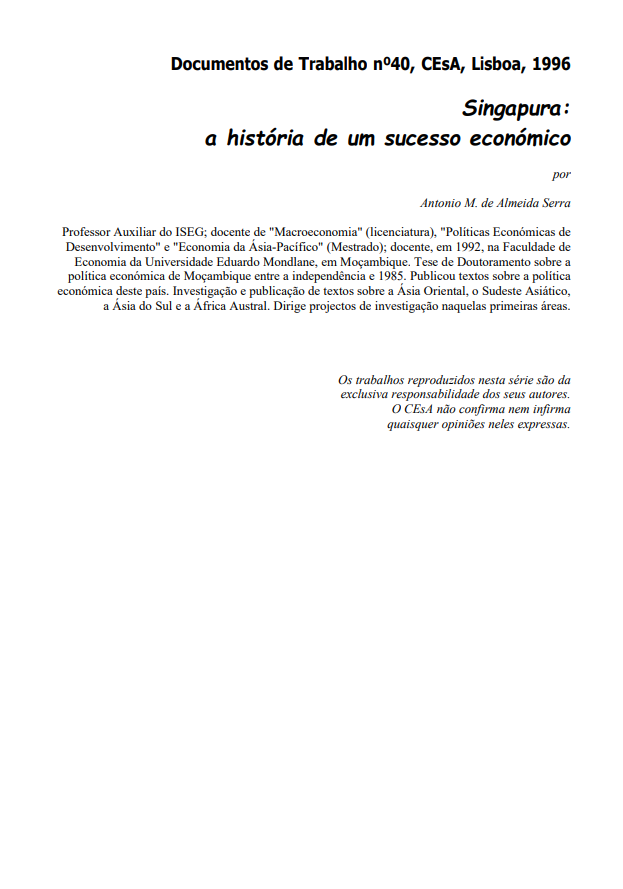
Working Paper 40/1996: Singapura: a história de um sucesso económico
Abstract:
Singapore is an island situated at the southern tip of the Malay Peninsula, where the sea route to the East bends from the Indian Ocean to the Pacific. It was this strategic situation that led the English businessman Stamford Raffles, representative of the East India Company, to found a trading and ship supply depot there in 1819. Started from scratch – the island was covered by virgin forest and sparsely inhabited – this fact and its strategic situation would decisively influence the history of the city-state: an economy with an important warehouse aspect, (almost) no agricultural sector and no rural population, a meeting point for various ethnic groups and a trading post serving all of East Asia, in particular Southeast Asia. Singapore is the story of an economic success story, of a country that managed to overcome underdevelopment. The central objective of Singapura: a história de um sucesso económico is to understand the reasons for such success and, namely, the main lines of the economic strategy(s) pursued over time and which enabled such evolution. Within this framework, special attention will be paid to the economic policy measures that shaped that strategy(s) and the main results to which they led.
Quotation:
Serra, António M. de Almeida. 1996. “Singapura: a história de um sucesso económico”. Instituto Superior de Economia e Gestão. CEsA – Documentos de Trabalho nº 40/1996.
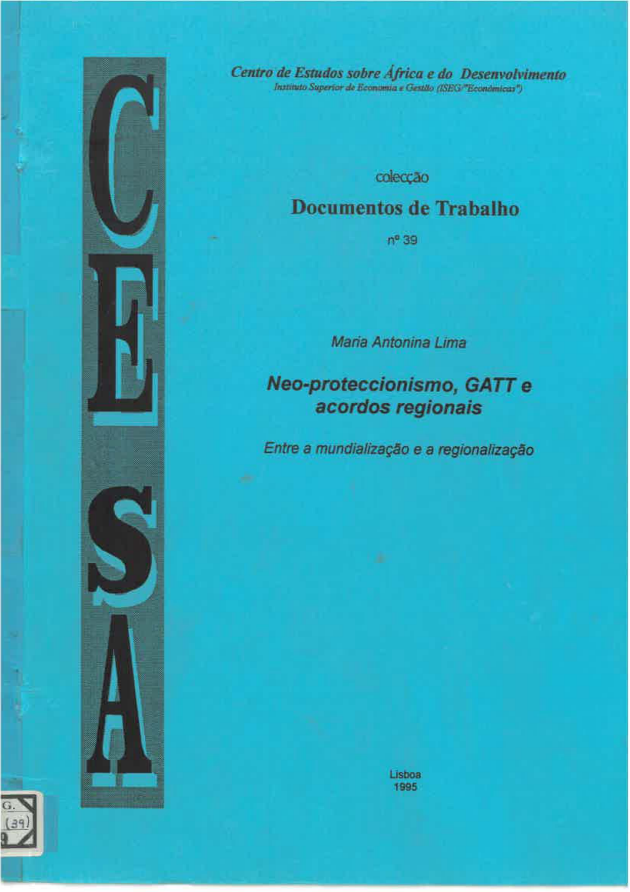
Working Paper 39/1995: Neo-proteccionismo, GATT e acordos regionais: entre a mundialização e a regionalização
Abstract:
The recent “surge” of regionalization agreements and, in particular, free trade areas coexists temporarily with the intensive use of protectionist measures of a non-tariff nature and with the agreement resulting from the Multilateral Trade Negotiations (NCM) of the Uruguay Round. This is the immediate reason that leads us to reflect on these three aspects. Since the virulence of the neo-protectionist outbreak was widely recognized by the literature and by international organizations and, in particular, the GATT, an initial analysis is sought in Neo-proteccionismo, GATT e acordos regionais: entre a mundialização e a regionalização, which naturally presents limitations, on the intensive use of regional trade agreements, in the already stated. It is a question of thinking about why the same countries largely use non-tariff barriers to protect themselves (point 1), agree on tariff and non-tariff reductions within the framework of the final agreement of the Uruguay Round, while at the same time proposing to extend liberalization to the trade in services and protect intellectual property within the framework of the constitution of the World Trade Organization (WTO) (point 2), and establish regional trade agreements of great diversity and heterogeneity and highly differentiated spatial dimension (nature, sectoral coverage, impacts on world trade, impacts on FDI) (point 3).
Citação:
Lima, Maria Antonina .1993. “Neo-proteccionismo, GATT e acordos regionais: entre a mundialização e a regionalização”. Instituto Superior de Economia e Gestão. CEsA – Documentos de Trabalho nº 39/1995.
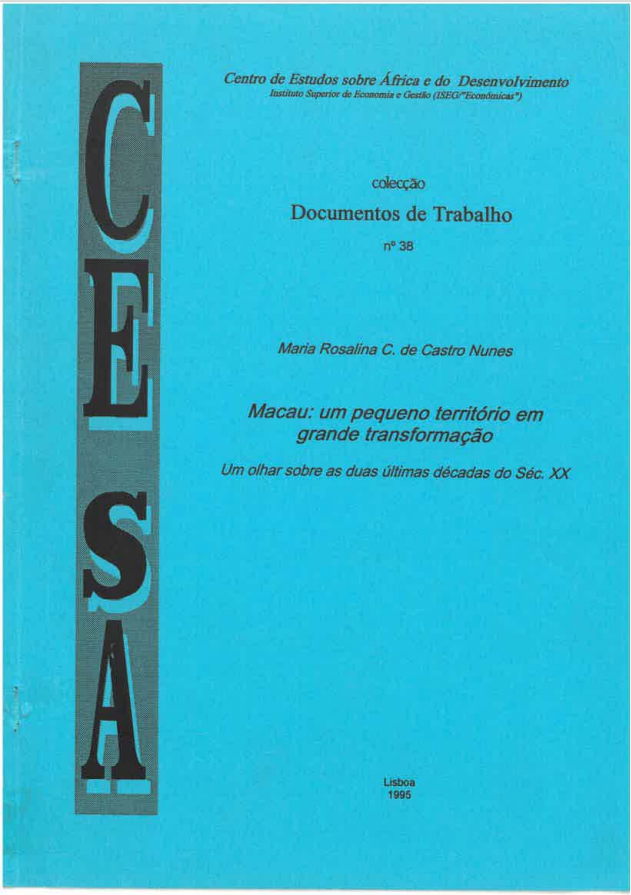
Working Paper 38/1995: Macau: um pequeno território em grande transformação: um olhar sobre as duas últimas décadas do séc. XX
In Macau, um pequeno território em grande transformação: um olhar sobre as duas últimas décadas do séc. XX we discuss how Macau, is a small territory, strategically located in Southeast Asia, which is reason enough for the role of a trading post that it has historically assumed. Its small geographic dimension and the lack of natural resources forged the profile of its economy, extraordinarily open and providing the emergence of an important exporting industrial sector, within the scope of its economic space. The analysis of some of the main economic indicators confirms its great vulnerability to external conjunctural variations and a high degree of dependence on neighboring countries and territories, especially Hong Kong and the PRC, from where raw materials, equipment and even goods arrive. food products, constituting, on the other hand, an important market for their products. It is therefore not an exaggeration to say that Macau imports everything it consumes and exports everything it produces. On the other hand, the scarcity of land and manpower, associated with the imminent integration of Macau into a region where these factors are not rare and which constituted the test balloon of China’s opening policy, presenting spectacular growth indicators, make seriously think about reconverting the economy, with an emphasis on the tertiary sector, where financial activity, trading and specialized services would stand out. After all, the universal trend in the evolution of industrialized economies towards outsourcing seems to apply to Macau as well, and it seems to us to be the development strategy that will best sustain the identity and degree of autonomy desired for the future MSAR. Furthermore, the infrastructures related to transport and communications, completed, in progress and planned, support this thesis: on the one hand, they greatly increase accessibility to this terminal area in southern China and, on the other hand, they constitute, some of them, poles of attraction for tertiary activities.
Quotation:
Nunes, Maria Rosalina C. de Castro. 1995. “Macau, um pequeno território em grande transformação: um olhar sobre as duas últimas décadas do séc. XX”. Instituto Superior de Economia e Gestão. CEsA – Documentos de Trabalho nº 38/ 1995.
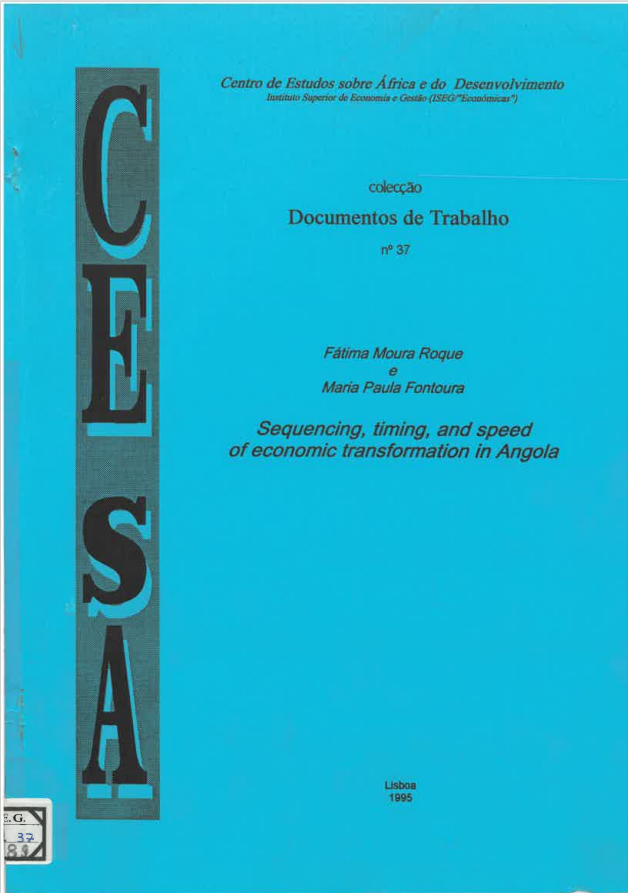
Working Paper 37/1995: Sequencing, timing, and speed of economic transformation in Angola
Abstract:
In the context of crisis described in Sequencing, timing, and speed of economic transformation in Angola, the immediate priority in the structural and systemic transformation programme (SSTP) for Angola is emergency measures to (i) rehabilitate the social and economic infrastructures, (ii) permit war refugees and demobilized former combatants to be reintegrated into civilian society, and (iii) satisfy the basic needs of the population, thereby assisting in the reduction of absolute poverty. Angola’s recent political culture will have to change, to accept the need for political and cultural tolerance and democratically sanctioned expression of diverse (even opposing) needs, interests and views. Justice must come to be applied effectively and impartially. Unless this can be achieved, equitable and sustainable growth and development will be impossible. In economic terms, the severe macroeconomic distortions, destroyed infrastructures, institutional weakness of both public and private sectors, reassertion (in 1993) of command measures and the reversal of earlier partial microeconomic liberalization programmes, and the pervasive corruption, make the transformation process long and complex. Addressing the formidable challenges of reconstruction and development in Angola will necessarily involve high social costs during the transition. To attenuate these, the international community has an important role to play through humanitarian aid; technical assistance; development aid for reconstruction of economic and social infrastructures; concessionary finance for construction of a social safety net; and appropriate debt relief. The primary responsibility, however, rests on the Angolans themselves.
Quotation:
Roque, Fátima Moura e Maria Paula Fontoura. 1995. “Sequencing, timing, and speed of economic transformation in Angola”. Instituto Superior de Economia e Gestão. CEsA – Documentos de Trabalho nº 37/ 1995.
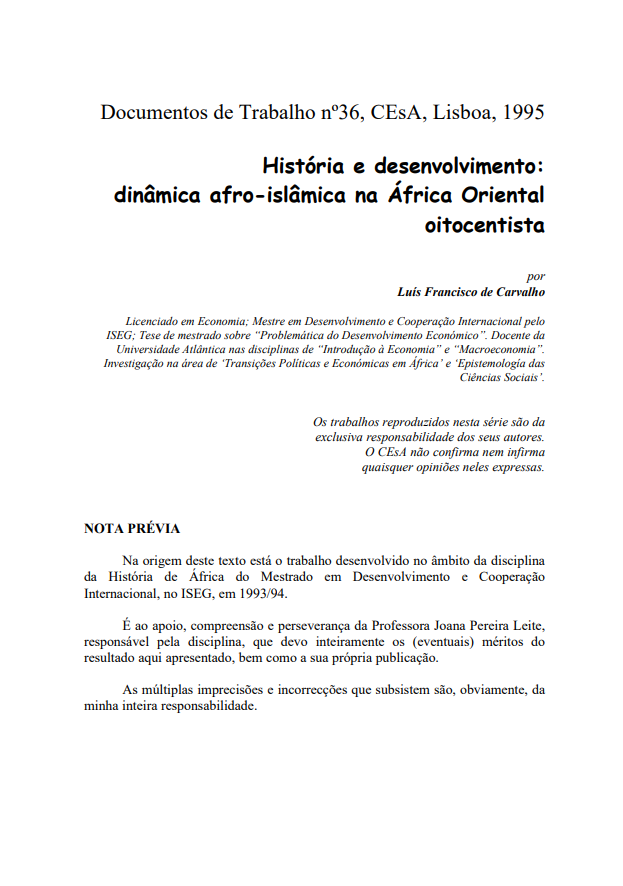
Working Paper 36/1995: História e desenvolvimento: dinâmica afro-islâmica na África Oriental oitocentista
Abstract:
As Elikia M’Bokolo argues, the 19th century in Africa was characterized by a broad process of “advancement of frontiers” – in the multidimensional sense to which the analogy with studies on the “American frontier” refers (1992, p. 191). The guiding axis of the analysis of História e desenvolvimento: dinâmica afro-islâmica na África Oriental oitocentista, its field of reference, focuses, in turn, on the much-debated issue of economic development. As we suggest in the title, it is about confronting, from a concrete historical situation, the domains of “history” and “development”. In the Section I will, in this sense, explore the methodological/epistemological foundations that support the integrative démarche of the historical developmentalist analysis of (African) societies that is defended here. able to establish more precisely the contours of the historical questioning to be undertaken in the following section. In the Section II will begin with a brief exposition of the antecedent historical conditions that project, in the space under analysis, the iod of the 19th century. Then, a general narrative framework will be presented of the results that, from the small bibliographic exploration undertaken, can be established for the historical problem under discussion. Namely, these will be measured in terms of “economic” and “socio-cultural” dynamics. The exhibition will conclude with an opening to the culturalist/identity issue, which currently benefits from such a wide dissemination. In this sense, Section III, after the aggiornamento in the face of the historical problematic presented in the methodological developments of Section I, seeks to articulate the preceding discussion with a (very brief) presentation of the main coordinates in which, from our perspective, the culturalist debate can be framed. . The text will end with the defense of an “effective trans-culturality”.
Quotation:
Carvalho, Luís Francisco de. 1995. “História e desenvolvimento: dinâmica afro-islâmica na África Oriental oitocentista”. Instituto Superior de Economia e Gestão. CEsA – Documentos de Trabalho nº 36/ 1995.
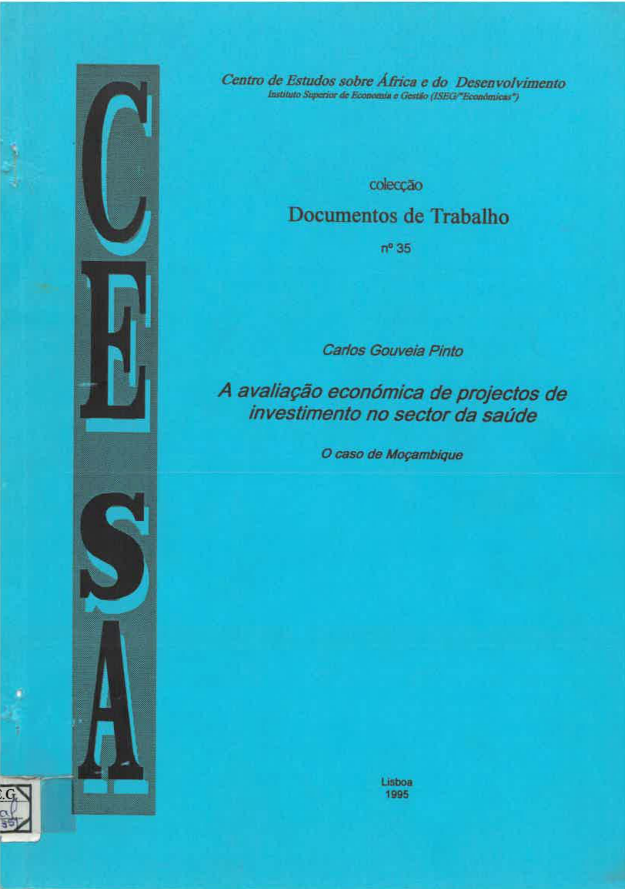
Working Paper 35/1995: A avaliação económica de projectos de investimento no sector da saúde: o caso de Moçambique
Abstract:
In most countries, public investment in the health sector is carried out without the criteria underlying the decisions being made explicit. At most, it is possible to deduce that priorities are established taking into account the degree of coverage of the population, with greater importance (since the Alma Ata conference) being given to primary health care services. This implies considering that, ultimately, the contribution of the health sector to social well-being depends on the density of care (especially first-line care), determined on the basis of demographic criteria. But this approach is manifestly insufficient. In fact, by basing decisions solely on demographic trends, the health conditions of the population are not considered. In particular, no role is given to morbi-mortality indicators. A avaliação económica de projectos de investimento no sector da saúde: o caso de Moçambique defends the position that it is desirable that, in the case of Mozambique, the investment process should be flexible, reflecting local constraints. This is due, in the first place, to the fact that the orientation followed by the Mozambican health policy (since 1975) coincides with the recommendations generally advanced by international experts and, in particular, by the World Bank, so the adoption of the conclusions of the your report would be redundant.
Quotation:
Pinto, Carlos Gouveia. 1995. “A avaliação económica de projectos de investimento no sector da saúde: o caso de Moçambique”. Instituto Superior de Economia e Gestão. CEsA – Documentos de Trabalho nº 35/1994.
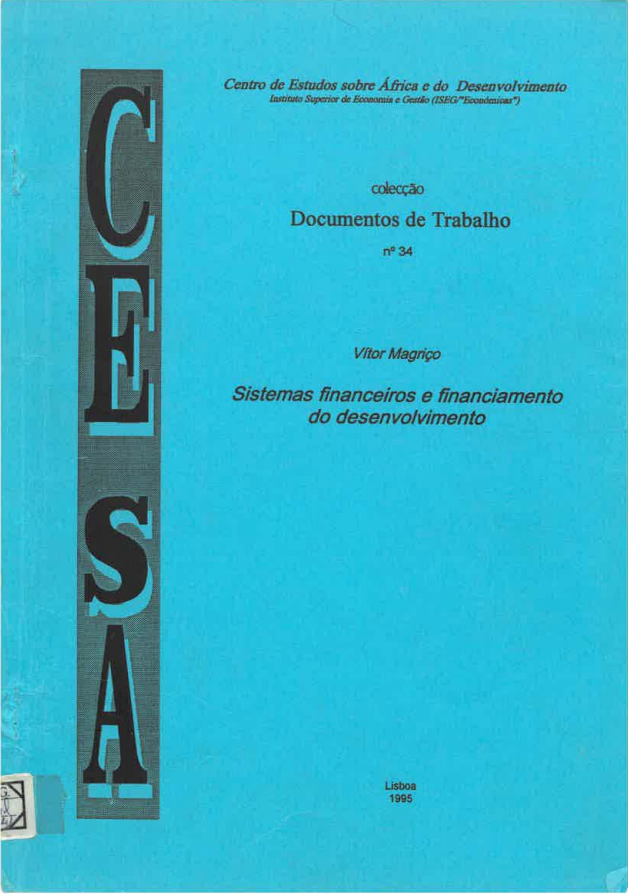
Working Paper 34/1995: Sistemas financeiros e financiamento do desenvolvimento
Abstract:
Sistemas financeiros e financiamento do desenvolvimento has different characteristics from those usually published in collections of this type, including itself. In fact, it is a “class guide” prepared by the author and intended to support the study of the subject Financial Systems and Development Finance of the Master’s in International Development and Cooperation taught at the School of Economics and Management (ISEGIUTL). Hence its characteristic form. Although CEsA is aware of the difference between this and the other titles published in this collection, given the interest of the topic, the quality of the text and the fact that it is one of the few documents on the subject prepared by a Portuguese author, it decided to publish it so that it could be made available to a wider public who might be interested in the topics it covers. We intend to fulfill the objective of our program by successively addressing three major themes: a framework that allows us to discuss the relationship between financing and development on a theoretical basis (point 2); role of financial intermediation and sources of financing in the development process (point 3) and importance of economic policy for strengthening domestic savings in developing economies (point 4). However, we start our program with an introductory point in which we intend to approach the evolution of the financing structure of the economies that are our object of study.
Quotation:
Magriço, Vitor. 1995. “Sistemas financeiros e financiamento do desenvolvimento”. Instituto Superior de Economia e Gestão. CEsA – Documentos de Trabalho nº 34/1995.
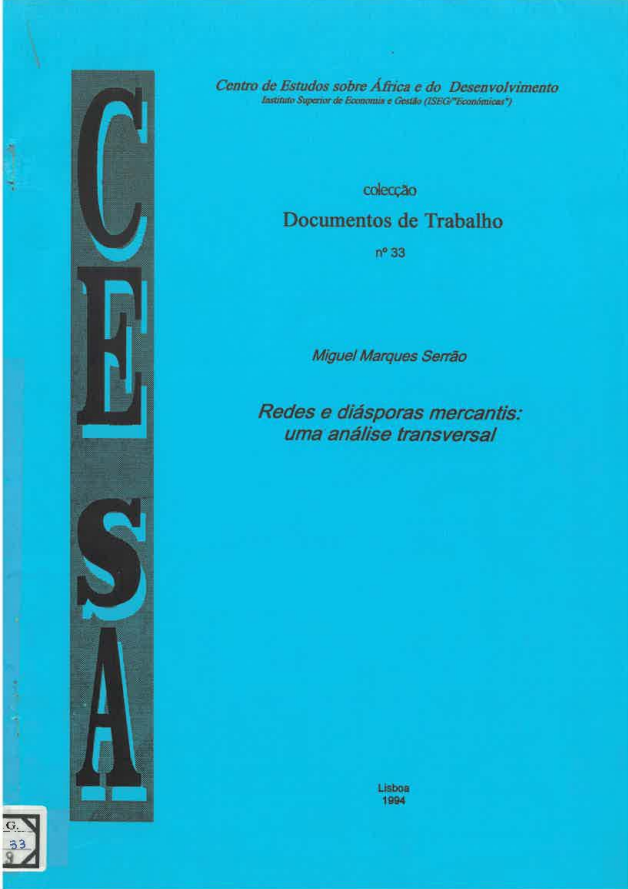
Working Paper 33/1994: Redes e diásporas mercantis: uma análise transversal
Abstract:
In Redes e diásporas mercantis: uma análise transversal, we propose to study the “mercantile means” in three essential and deeply interrelated aspects: – the first concerns its internal organization; its logic of action and accumulation. Particularly important in this regard is the study of the “network system” which, as we shall see, constitutes a complex form of organization, with remote origins but revealing, at the same time, an inexhaustible adaptive and dynamic capacity. We will also attempt a systematic typification of the most common “modalities” of accumulation. – secondly, it is important to clarify which exogenous dynamics influence mercantile action. It is intended, above all, to study the different forms of articulation between the family/lineage, social, political and religious spheres and the mercantile means. Basically, the different “fields” that will shape mercantile action but that, simultaneously, are being reconfigured under its influence. Particular attention should be given to the ideological “conditions” (for example, in the sphere of religion) appropriated by mercantile networks and, sometimes, modified according to their own interests. Finally, we intend to address the issue of the insertion of mercantile networks in space and time. The first dimension is fundamental, either because of its central position in the elaboration of mercantile accumulation strategies, or because the network expansion process is almost always confused with migratory movements that configure authentic “mercantile diasporas” (hence, the choice of title of this work). The second dimension makes it possible to investigate the issue of diachronic continuity of trade networks. A long-term view is useful, namely, because it facilitates the analysis of the elements of “permanence” and “break” that frame our object of study.
Quotation:
Serrão, Miguel Marques. 1994. “Redes e diásporas mercantis: uma análise transversal“. Instituto Superior de Economia e Gestão. CEsA – Documentos de Trabalho nº 33/1994.





